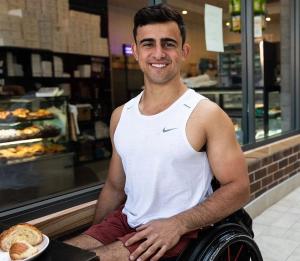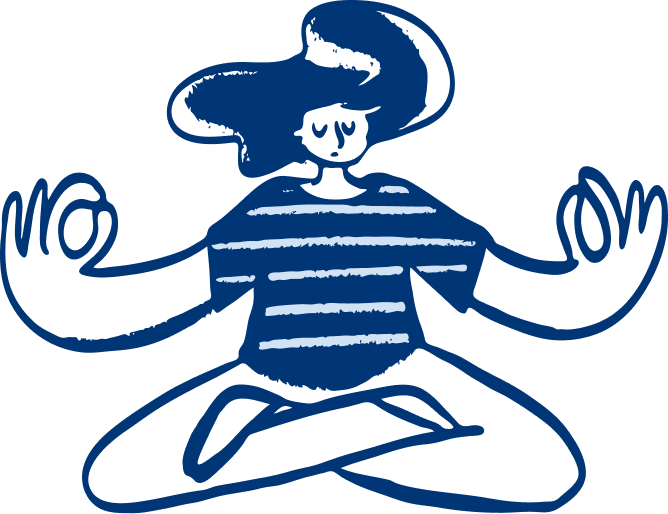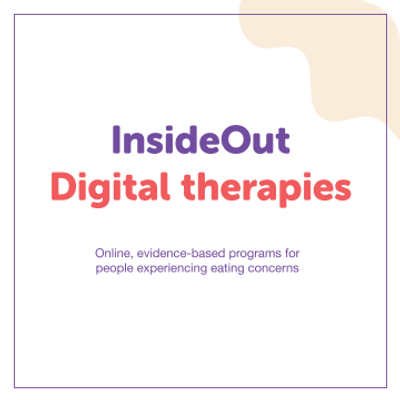Understanding eating challenges
It’s not uncommon for people to think a lot about food, exercise, or how they look. Sometimes, these thoughts and behaviours start with good intentions, like trying to eat healthier or get fitter. At first, the changes might feel positive, helping you feel more energised or in control.
But for some, the changes can start to feel overwhelming. You might notice you’re spending more time thinking about food or exercise than you want to, feeling stressed about sticking to certain ‘rules’, or avoiding social activities because of it. These can be signs of eating challenges.
Eating challenges, commonly referred to as ‘disordered eating’, can involve a wide range of thoughts, feelings, and patterns that can affect how you feel, socialise, and live your day-to-day life.
- If you’re experiencing eating challenges, you might have thoughts and feelings like:
- Food is something to fear or avoid
- A sense of guilt or shame after eating
- Like your body isn’t the ‘right’ size or weight
- Not meeting certain weight or food goals means you’ve failed
- Controlling how you eat and/or exercise is the only way to feel in control of your life
- Fear of judgement or misunderstanding has left you feeling lonely and isolated.
Keep in mind that experiencing any of the above isn’t your fault. These feelings and behaviours aren’t choices you’ve made; they’re part of how eating challenges can affect both your mind and body.
With time, support, and small steps, it’s possible to feel more in control and find balance again. You’re not alone in this.
What’s the difference between eating challenges and an eating disorder (ED)?
Sometimes, eating challenges can develop into a type of eating disorder (ED) like anorexia nervosa, bulimia nervosa, or binge eating disorder.
EDs can have serious impacts on your mental and physical wellbeing. They can affect anyone regardless of age, gender, sexuality, cultural background, or body size.
Contrary to common myths and misconceptions surrounding EDs, there’s no single way to ‘look’ or be affected by EDs, which is why they can be difficult to recognise.
For example, EDs can look like:
- A man feeling controlled by routines while trying to build muscle at the gym
- A woman becoming preoccupied with eating only ‘clean’ or ‘healthy’ foods
- A person using laxatives to manage their weight
- A teen overusing exercise as a way to deal with stress and anxiety
- A child refusing food for no apparent reason.
For some, eating challenges and/or EDs can be a lifelong challenge. For others, they might only show up during times of stress.
No matter how long or in what way your eating challenges or ED shows up, your experience is valid and help is available.
What is body image?
Body image is how you see and feel about your body. It’s natural to sometimes compare yourself to others or wish you looked a certain way, but when these thoughts become overwhelming, they can start to affect how you feel about yourself and your relationship with food. In some cases, these feelings can contribute to eating challenges or EDs.
These feelings can also impact your confidence, relationships, and daily life. With so many unrealistic messages about appearance around us, it’s no surprise that these struggles are common. It may feel challenging, but it is possible to build a kinder, more positive relationship with your body.
Understanding body dysmorphic disorder (BDD) and body obsession
Body dysmorphic disorder (BDD) is when you become intensely focused on perceived flaws in your appearance. These are flaws that often aren’t noticeable or may not even exist. The thoughts and feelings that come with BDD can take over daily life by affecting your self-esteem, relationships, and routines.
Signs of BDD may include:
- Constantly checking mirrors or avoiding them altogether
- Comparing your appearance to others, especially on social media
- Seeking reassurance about perceived flaws from others
- Feeling the urgent need to cover perceived flaws with makeup, clothing, or accessories, even in situations like being home alone
- Avoiding social situations out of fear others will notice or judge these perceived flaws.
Body obsession, on the other hand, involves an intense focus on achieving a specific body shape or look, often driven by societal ideals. This might mean fixating on weight loss, muscle gain, or meeting unrealistic beauty standards.
Both BDD and body obsession can cause frustration, low self-worth, and withdrawal from others.
It’s important to know these thoughts are not your fault, and support is available to help you feel more confident and free. Click here to learn more about BDD at Butterfly's website.

“I was obsessed with the gym - six days a week training and eating to extremes. It looked like I was achieving my goals. But despite all the attention I got, I was feeling like things were overwhelming to the point where there was no other option.”
The connection between eating challenges and mental health
Eating challenges and EDs often overlap with mental health challenges like anxiety, depression, or low self-esteem. These struggles can shape behaviours around food, exercise, or appearance as a way to cope with difficult emotions.
How mental health can influence eating behaviours:
- Coping with emotional distress: Feeling low, anxious, or overwhelmed might lead to changes in eating or exercise habits to feel more in control
- Perfectionism or fear of failure: Rigid behaviours, like strict dieting or over-exercising, may come from a drive to feel ‘good enough’ or worthy
- Stress and helplessness: In uncertain or stressful times, focusing on food or appearance might feel like the only thing within your control.
While these behaviours might feel like they help in the moment, they can become hard to manage over time. In fact, they may intensify the very feelings they were meant to relieve. For example, restricting food to ease anxiety can lead to fatigue or irritability, which might make the anxiety worse.
These behaviours are not about vanity or lack of willpower. They’re often linked to deeper emotional struggles. Recognising this connection is a meaningful step toward understanding what’s really going on and exploring ways to feel better.
For free and confidential counselling for EDs and body image concerns, you can contact Butterfly's National Helpline 1800 ED HOPE (1800 33 4673), chat online, or email support@butterfly.org.au. It’s available 7 days a week, 8am-midnight (AEST/AEDT).
Explore more information, resources, and support services
In this topic, you’ll find information and resources that can help you find understanding, hope, and support options that feel right for you.
Learn about:
- The different types of EDs and common causes of EDs
- Potential signs of eating challenges and impacts on your wellbeing
- Practical things you can do to feel better right now and in the long term
- Where to find support services, tools and apps, and stories of hope
- Tips for friends and family wanting to offer support while protecting your own welbeing.
Thinking about changing any type of habit or routine can feel scary. It’s natural if you’re feeling hesitant or stressed right now. But remember, talking to someone you trust about what you’re going through or seeking professional support can make a big difference.
With the right care, you can absolutely live a healthy and fulfilling life. The fact that you’re here is something you should already be really proud of.
You don't have to face this alone.
Eating challenges and EDs can lead to thoughts, feelings, and behaviours related to suicide.
If you're feeling overwhelmed or in crisis, you can connect with Lifeline 24 hours a day, 7 days a week via 13 11 14, text, and chat. We’re here to listen to whatever it is you’re going through.
Click here to download, save, or print our eating and body image fact sheet.





